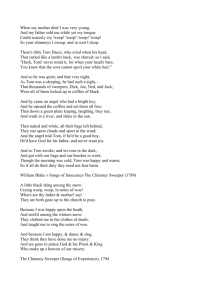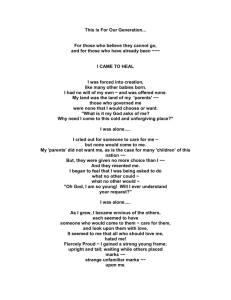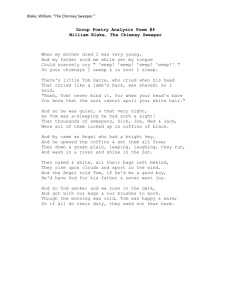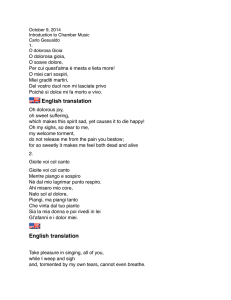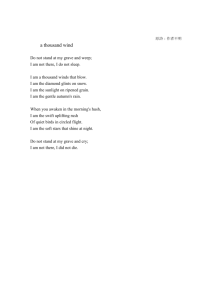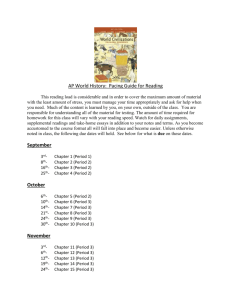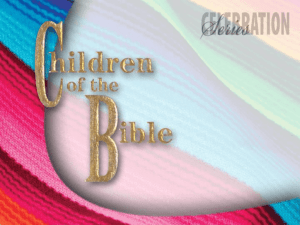File
advertisement
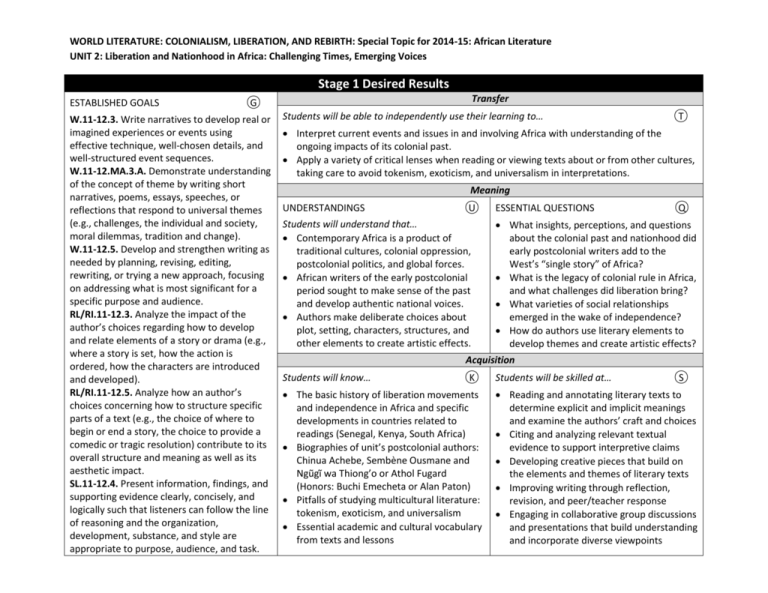
WORLD LITERATURE: COLONIALISM, LIBERATION, AND REBIRTH: Special Topic for 2014-15: African Literature UNIT 2: Liberation and Nationhood in Africa: Challenging Times, Emerging Voices Stage 1 Desired Results ESTABLISHED GOALS Transfer G ○ W.11-12.3. Write narratives to develop real or imagined experiences or events using effective technique, well-chosen details, and well-structured event sequences. W.11-12.MA.3.A. Demonstrate understanding of the concept of theme by writing short narratives, poems, essays, speeches, or reflections that respond to universal themes (e.g., challenges, the individual and society, moral dilemmas, tradition and change). W.11-12.5. Develop and strengthen writing as needed by planning, revising, editing, rewriting, or trying a new approach, focusing on addressing what is most significant for a specific purpose and audience. RL/RI.11-12.3. Analyze the impact of the author’s choices regarding how to develop and relate elements of a story or drama (e.g., where a story is set, how the action is ordered, how the characters are introduced and developed). RL/RI.11-12.5. Analyze how an author’s choices concerning how to structure specific parts of a text (e.g., the choice of where to begin or end a story, the choice to provide a comedic or tragic resolution) contribute to its overall structure and meaning as well as its aesthetic impact. SL.11-12.4. Present information, findings, and supporting evidence clearly, concisely, and logically such that listeners can follow the line of reasoning and the organization, development, substance, and style are appropriate to purpose, audience, and task. Students will be able to independently use their learning to… T ○ Interpret current events and issues in and involving Africa with understanding of the ongoing impacts of its colonial past. Apply a variety of critical lenses when reading or viewing texts about or from other cultures, taking care to avoid tokenism, exoticism, and universalism in interpretations. Meaning UNDERSTANDINGS U ○ Students will understand that… Contemporary Africa is a product of traditional cultures, colonial oppression, postcolonial politics, and global forces. African writers of the early postcolonial period sought to make sense of the past and develop authentic national voices. Authors make deliberate choices about plot, setting, characters, structures, and other elements to create artistic effects. ESSENTIAL QUESTIONS Q ○ What insights, perceptions, and questions about the colonial past and nationhood did early postcolonial writers add to the West’s “single story” of Africa? What is the legacy of colonial rule in Africa, and what challenges did liberation bring? What varieties of social relationships emerged in the wake of independence? How do authors use literary elements to develop themes and create artistic effects? Acquisition Students will know… K ○ The basic history of liberation movements and independence in Africa and specific developments in countries related to readings (Senegal, Kenya, South Africa) Biographies of unit’s postcolonial authors: Chinua Achebe, Sembène Ousmane and Ngũgĩ wa Thiong’o or Athol Fugard (Honors: Buchi Emecheta or Alan Paton) Pitfalls of studying multicultural literature: tokenism, exoticism, and universalism Essential academic and cultural vocabulary from texts and lessons Students will be skilled at… S ○ Reading and annotating literary texts to determine explicit and implicit meanings and examine the authors’ craft and choices Citing and analyzing relevant textual evidence to support interpretive claims Developing creative pieces that build on the elements and themes of literary texts Improving writing through reflection, revision, and peer/teacher response Engaging in collaborative group discussions and presentations that build understanding and incorporate diverse viewpoints Stage 2 – Evidence Evaluative Criteria Clarity and organization of creative piece and details included to develop it Relevance of plot, character development, and themes to selected reading(s) Indirect citation of details from original Evidence of work on writer’s craft Observance of genre’s writing conventions Seminar: Originality of contributions Test: Level of understanding in creative part, detail and accuracy in open response Lesson: Clarity and depth of presentation Responses: Clarity of interpretation and citation of relevant textual evidence Assessment Evidence TT ○ TRANSFER TASK(S): Write a creative piece in which you “intervene” in some way in one (or more) of the major readings for this unit: The Money Order; Weep Not, Child; “Master Harold” … and the boys. The intervention could be a change in point of view, a sequel, a modernized version, a dialogue bringing two authors together, or another idea that you think of. The purpose will be to illuminate and comment on the original story using your knowledge of Africa today. OE ○ OTHER EVIDENCE: Socratic Seminar on Things Fall Apart “tragic hero” and “things fall apart” themes Colonialism unit test with take-home creative portion and open-response questions Student-led lesson on Weep Not, Child or “Master Harold” … and the boys Informal responses to prompts on assigned readings Stage 3 – Learning Plan January 2015 5 Lesson 1: Workday to prepare for Things Fall Apart Socratic seminar HW: Complete questions 12 Lesson 6: Introduction to postcolonial period, discussion of Money Order HW: Money-Order to 118 19 (No school) Martin Luther King Day 26 Lesson 15: Small-group sessions on Weep, Master with planning for lessons HW: Research/writing task 6 Lesson 2: Socratic seminar on TFA “tragic hero” and “things fall apart” themes HW: Review unit notes 13 Lesson 7: View first part of film Mandabi, discussion; workshop on revising HW: Money-Order to end 20 Lesson 11: Small-group discussions of Weep Not, Child and Master Harold HW: Weep or Master ____ 27 Lesson 16: Group work on Weep and Master lessons HW: Complete first draft of creative writing piece 7 Lesson 3: Unit review for take-home/in-class test HW: Work on take-home portion of test (due Friday) 14 (Early release day) Lesson 8: Money Order discussion, highlighting author’s craft and choices HW: Revise writing piece 21 Lesson 12: Small-group sessions on Weep, Master HW: CP: assigned articles; H: finish reading notebook 28 Lesson 17: Rehearsal for lessons; writing workshop HW: Prepare for student lessons on Weep, Master 8 (Advisory day) Lesson 4: Introduction to unit readings by Sembene, Ngũgĩ and Fugard (choice) HW: Complete take-home 15 Lesson 9: View final part of film Mandabi, discussion HW: Read “Weaverdom”; complete writing revision 22 Lesson 13: Discussion of articles (CP) and books (H) HW: CP: assigned articles; H: review book for AP test 29 Lesson 18: Student-led lesson on Weep Not, Child HW: Complete final draft of creative writing piece 9 Lesson 5: In-class portion of test; choose one piece of writing for revision HW: Money-Order to 100 16 Lesson 10: “Weaverdom” discussion; writing folder and participation review HW: Weep or Master ____ 23 (Midpoint of term) Lesson 14: Discussion and research task related to articles (CP); AP test (H) HW: Finish Weep, Master 30 Lesson 19: Student-led lesson on Master Harold HW: Write final reflection on postcolonial readings
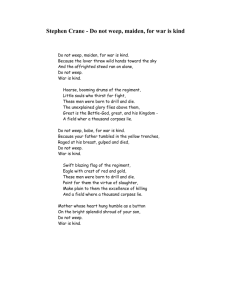
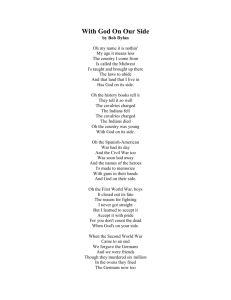
![War Is Kind [excerpt] by Stephen Crane](http://s3.studylib.net/store/data/007292208_1-bcb6282775eb864728fa7d561a15ee54-300x300.png)
